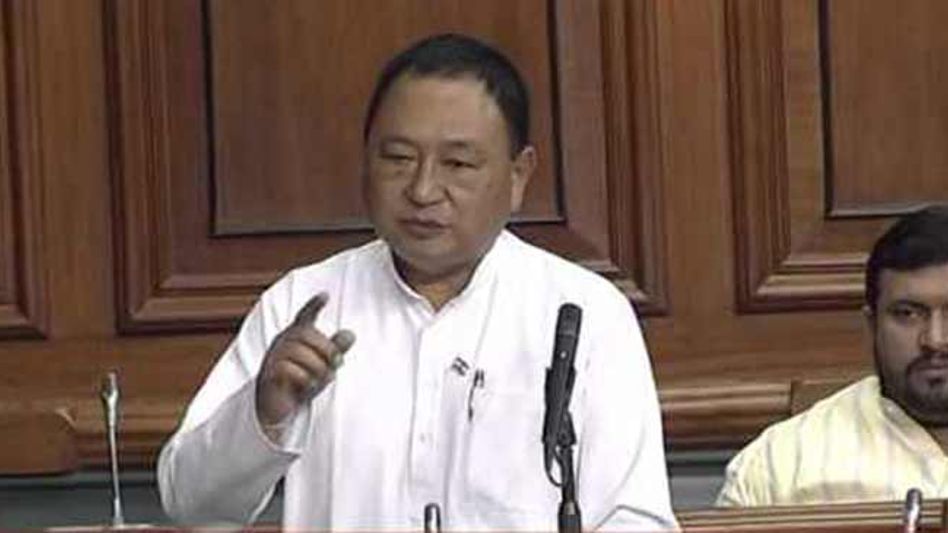The injustice of the Justice system - getting away with torture
 Torture
TortureBy Abhishek Ranjan
“Fundamental rights do not flee the person as he enters the prison although they may suffer shrinkage necessitated by incarceration.”
- Supreme Court of India in Sunil Batra v. Delhi Administration
Hon’ble Member of Parliament from Arunachal – East, Mr. Ninong Ering will be introducing “The Prevention of Custodial Torture Bill, 2018” in the ongoing winter session of the Lok Sabha to provide for punishment for torture, other cruel, inhumane or degrading treatment inflicted by public servants or any person with the consent or acquiescence of any public servant; to protect the interests of the victims, complainants and witnesses from all kinds of ill-treatment while in custody and to compensate the victim suitably, and for matters connected therewith or incidental thereto.
Every human being is entitled to certain inherent rights simply by virtue of being a human. These rights, often known as basic rights, fundamental rights, natural rights or human rights are generally inviolable and cannot be infringed upon on grounds of religion, caste, sex, race, place of birth etc. Protection of these rights and liberties is the primary object of the state and is necessary for the overall development of and for maintaining harmony and order in the society. The principle underlying the Charter of the United Nations is that the recognition of these inalienable rights and guaranteeing them equally to all members of the human family is the foundation of freedom, justice and peace in the world.
Amongst several other human rights instruments, Article 5 of the Universal Declaration of Human Rights and Article 7 of the International Covenant on Civil and Political Rights provide that no person shall be subjected to torture or to cruel, inhuman or degrading treatment or punishment. It is in this background that the United Nations Convention against Torture and Other Cruel, Inhuman or Degrading Treatment or Punishment (hereinafter referred to as “CAT”) was adopted by the United Nations General Assembly in 1984, placing an obligation upon state parties to take all effective legislative, administrative, judicial or other measures to prevent all acts of torture in any territory under its jurisdiction. It defines torture as – “any act by which severe pain or suffering, whether physical or mental, is intentionally inflicted on a person for such purposes as obtaining from him or a third person information or a confession, punishing him for an act he or a third person has committed or is suspected of having committed, or intimidating or coercing him or a third person, or for any reason based on discrimination of any kind, when such pain or suffering is inflicted by or at the instigation of or with the consent or acquiescence of a public official or other person acting in an official capacity. It does not include pain or suffering arising only from, inherent in or incidental to lawful sanctions.” India signed the convention in 1997, though, it has not been ratified to this day.
Article 21 of the Indian Constitution provides that nobody can be deprived of his life and liberty without following the procedure prescribed by law. The right to life is supreme and basic. It includes the negative obligation of the State to abstain from doing anything arbitrary that deprives an individual of his life as well as the positive obligation requiring the State to protect the right to life of every person within its territorial jurisdiction. The Supreme Court has consistently held that custodial torture violates the right to life. Further, Article 20 provides that no person shall be compelled to become a witness against himself. Article 22 provides for protection from arrest and detention in certain cases. It states that no person shall be arrested without being informed of the grounds of arrest and ever person arrested shall be produced before the nearest judicial magistrate within a period of 24 hours of such arrest. The court, in Nahar Singh Yadav v. Union of India observed that a criminal trial that results in depriving an individual of his life and personal liberty has to be unbiased and conducted without any prejudice to the accused. Apart from the aforementioned constitutional provisions that solidly hold ground with respect to the rights of an accused person, there are several other statutory provisions that regulate the treatment of a person in custody. For example, Sections 46 and 49 of the Code of Criminal Procedure provide that a detenu accused of an offense not punishable with death or imprisonment for life cannot be subjected to more restraint than is necessary to prevent his escape. Section 54 of the Code extends safeguard against any infliction of custodial torture and violence by providing for examination of the arrested person by a medical officer. Section 57 requires the police to produce the suspect / accused before the nearest magistrate within 24 hours of arrest. It corresponds to Article 22(2) of the Constitution. Sections 330, 331, 342 and 348 of the Indian Penal Code, though do not define or punish custodial torture in express terms, have been designed in a manner to deter police officers from resorting to measures amounting to torture during the investigation.
The apex court of the country has also always taken a strict stand with respect to custodial violence. In Prithapal Singh etc. v. State of Punjab and Anr. etc., the Supreme Court observed that torture in not permissible irrespective of whether it occurs during investigation and interrogation or otherwise. It cannot be said that the dignity and freedom of an individual must yield to the security of the State. Further, in Munshi Singh Gautam v. State of M.Pit was said that cases of custodial violence must be looked at differently as compared to ordinary criminal cases because when a person is alleged to have died in custody, it is difficult to produce any kind of evidence. In D.K. Basu v. State of West Bengal, a landmark case on the rights of an accused, the court issued strict guidelines regarding arrest and detention and firmly observed that custodial violence including torture and death in lock ups strikes a blow at the rule of law which demands that the powers of executive should not only be derived from law but also that the same should be limited by law. In addition to this, the court in the above case also observed that failure to comply with the guidelines laid down in the case, shall apart from rendering the concerned official liable for departmental action and punishment for contempt of court.
Despite of all aforementioned safeguards, torture in police custody and in many cases, subsequent death continues to remain a pressing issue which needs to be addressed. The cases of death in police custody or in jails caused due to torture, more often than not, go unreported as the accused are wary of the consequences. Even if a case is registered, it is extremely difficult to produce evidence against the concerned officer as they are generally in charge of police station record which they can easily manipulate. The National Crime Records Bureau reported that between 2000 and 2016, there were 1,022 deaths in police custody of which FIRs were filed only in 428 cases. Even out of this, charge sheets were filed only in 234 cases. In essence, this means that only about one – fourth of the total cases of deaths in custody were actually tried by a court. It appears that custodial torture has become a common phenomenon and a routine police practice of interrogation these days. It causes only momentary public uproar but once the incident fades away into time, everything is forgotten.
Article 3 of the CAT places an obligation on State parties that no person shall be expelled, returned or extradited to another state where there are substantial grounds for believing that he would be in danger of being subjected to torture. Offenders are often not extradited to India by other countries as they are able to successfully plead that in absence of any strict law against torture, they may be subjected to such treatment in India. This further defeats the cause of justice.
The situation in alarming and unfortunate and this is why we need a strict law to prevent custodial torture and to punish persons who resort to it. The National Commission to Review the Working of the Constitution (2002) set up by the Law Ministry also specifically recommended for ‘prohibition of torture and cruel, inhuman or degrading treatment or punishment’ as one of the additions to the fundamental rights chapter as Article 21(2). The Law Commission has also recommended time and again that legislation to prevent custodial torture must be enacted. The objectives laid down in Preamble to the Constitution of India cannot be said to have been effectively achieved if even one person is arbitrarily deprived of any of his or rights and his denied justice. Even though the CAT is not binding and has not even be ratified by the State owes a duty to the international community and more importantly to its citizens that will do everything within its power to protect the rights of each and every person.
It is with this in mind that the Hon’ble Member of Parliament will introduce this bill and hope that the Lok Sabha will seriously consider it and members across all party lines will strive to pass the same in the interest of justice.
Authors:
Vijay K. Tyagi is a Legislative Assistant to Member of Parliament (LAMP) Fellow at the Office of Mr. Ninong Ering,
Saakshi Garg is a 4th Year Law Student at GGSIP University, New Delhi.
Copyright©2026 Living Media India Limited. For reprint rights: Syndications Today









